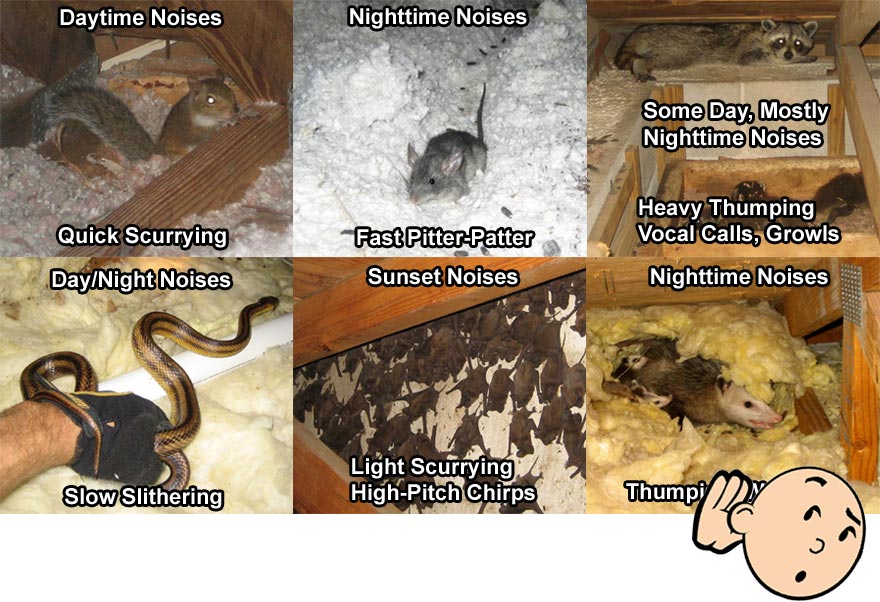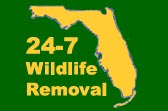| |
|
Noises in the Attic - Wild Animal
You might hear scratching noises in your attic, sometimes at night, or maybe during the day. This
means that animals are able to enter your attic. I most commonly deal with squirrels, raccoons, rats,
mice, and even opossums in attics.
If you hear noises in the attic at night, it's likely mice, rats, flying squirrels, raccoons, or maybe opossums. A fast, light, pitter-patter, in the attic
and maybe the walls, is likely to be a rodent like a mouse or rat. Heaver thumping or walking is likely to be a larger animal, like a
raccoon or opossum. If you hear noises during the daytime, particularly in the morning or evening, then it's most likely Eastern Gray squirrels.
If you don't live in Orlando FL, click here for the National Directory of Wildlife Trappers.

Above is an analysis of the various types of animals that can cause noises in the attic at night or daytime. Squirrels are really the primary animal to make daytime sounds, particularly in the early morning and early evening.
Raccoons will sometimes make daytime noises, but they are mostly a nocturnal animal. You're likely to hear them as they exit or re-enter the attic at night. Rats and mice make fast pitter-patter sounds at nighttime, across the
ceiling or even up the walls. I've never heard it personally, but people have told me about hearing "slithering" sounds when they have snakes in the attic. Opossums are slow walkers, so it sounds like slow heavy walking sounds
in the middle of the night. Bats make a high-pitched chirp, and when they're on the move at dusk to go outside you might hear a bunch of them lightly crawling along. Vocal sounds, like calls or growls, are almost always from
raccoons. Squirrels don't make any vocal noises. It can be hard to tell exactly just by sound, so your best bet is to check out my directory, and have a professional wildlife expert in your area come out and inspect your
home and attic.
In most cases, the solution to the loud noise problem upstairs is to trap and remove the animals from the attic space.
To take care of the problem permanently, the entry points must be identified and
sealed shut permanently, or else the animals are just going to get back in. Here are some examples.
Exclusion Barriers - Repairs to Holes Leading Into the Attic
1) Raccoons were crawling in this wide open hole in the soffit. 2) I cover the hole with heavy
gauge wire and bolt it down tight.
Example email from customer: Hello, I found your website a week or so ago when we'd been hearing some *big* skritching. And then I saw a couple of raccoons that were *BIG* in the neighborhood, and your site came up on raccoons & Orlando. Since then, the scratching
in the attic has gotten smaller, but it's still there, so I'm thinking we don't have those enormous raccoons, but we might just have mice or rats or ... something unwanted, let's just say. How much would it cost for you to come out and see if you can find anything in our house? We haven't seen any sign of animals in our kitchen yet, and we'd like to keep it that way. We live in Mountlake Terrace, so a bit outside of
Orlando proper, but still within the range on your website. Please email or call. Thanks, SarahD
For more photos of repairs, click here.
For photos of repairs to a barrel tile roof, click here.

What Is In My Wall Scratching?
If you have a rodent infestation, it is most likely that they have got into your walls as well as your attic. Rats, mice, squirrels, and even raccoons and opossums frequently get inside houses and create scratching noises in the walls and ceilings. Rodents in walls is a very common problem – you may find out that they are in there either through scratching noises coming from the walls or else you may smell them. Wall scratching is a known symptom of rodent infestation – rodents get into your walls through small cracks and holes in your home and then start to nest in your insulation. Once this happens, it can be a huge problem to fix as you not only have to get rid of the rodents but if the rodents have used the inner wall as a toilet (more than likely) then you also have to replace your wall insulation.
Once a rodent has nested inside your walls, unless you have jumped on the problem immediately, there is a good chance that baby rodents will appear very soon. Once this happens, the ability to get rid of the rodents lessens considerably and the task is much harder. One rodent alone can do immense damage to your house if left inside a wall, but imagine all of the wiring and woodwork that an entire family can destroy! If the problem has reached this level of severity, you ought to consider a professional to deal with it quickly and effectively.
What Noises Do Baby Squirrels Make In Attic
There are noises in your attic, and you have no idea what it is that’s making them. Is it mice, is it rats, or is it squirrels? How can you tell without going up there and trying to catch the varmints at it? Well, it’s relatively simple. Squirrels are daytime creatures, and thus if you can hear scraping, scratching or scampering sounds coming from your attic during the daytime, it is probably a squirrel infestation. You may also hear gnawing noises as the squirrels make holes in the walls and chew through beams and skirting boards. You may even hear noises coming from within the walls, as squirrels have a habit of nesting in the insulation found in wall cavities. This is more the case with younger squirrels, as the adult squirrels may leave the attic to hunt for food.
Female squirrels can have anything up to 2 litters of babies a year, and will try to find an attic in which to raise their young, especially if there is a notable absence of hollow trees outside. Once she has had her young, it is unlikely that they are going to leave of their own accord – if you do not notice the problem for many months you could end up with an entire colony of squirrels in the top of your home, so listen out for the warning noises!
|

